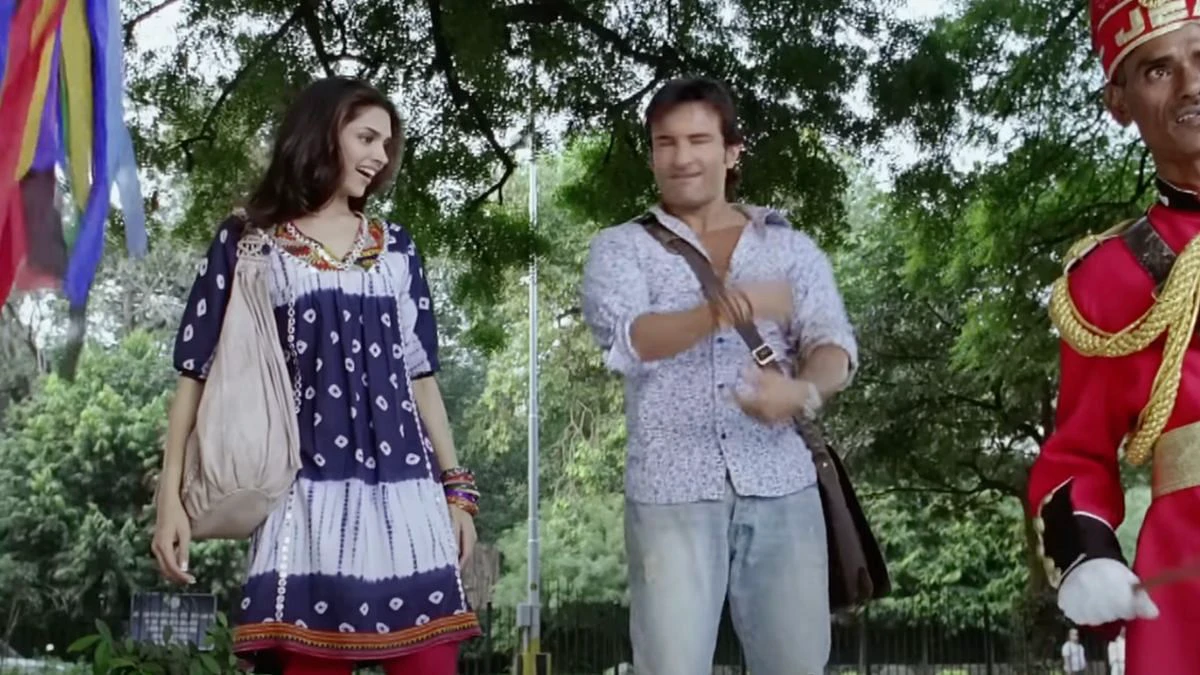Somewhere between climate collapse and the soul-numbing scroll of “situationship hacks” by ring light philosophers on reels, Bollywood has decided to throw a life raft at us.
But not just any raft – a velvet-draped, montage-scored, popcorn-scented tugboat of weaponised nostalgia.
Imtiaz Ali’s Love Aaj Kal (the good one, 2009) is back in theatres. The Ghost of Pritam Past has risen, guitar in hand, to soothe our collective meltdown and remind us that Chor Bazaari was a cute song, not the state of global affairs.
So, of course, nostalgia’s having a comeback – mainly because the present ghosted us, the future called in sick, and only the past still picks up our calls.
The death of rom-coms
We’re not watching Love Aaj Kal again for the plot (which honestly was never even the point). We’re watching it because Deepika Padukone made emotional devastation in the rain look cathartic.
We’re not swooning over the love story either – we’re grieving a time when a Geet-Aditya kind of romance felt plausible. But don’t get too dewy-eyed here, because here’s the real tea: Bollywood didn’t just move on from the rom-com – it murdered it. Slowly. Publicly. Death by charisma-free heroes with the emotional range of a tax return, one-liners that sound like HR announcements, and chemistry so off you’d think the leads met on a group project, not a film set.
And producers? Oh, they noticed. The trailers that tanked, the recycled tropes, the memes, and the heat of a PR-arranged brunch. And eventually, Bollywood decided to milk the public’s heartbreak for box office gold.
The industry collectively said, “Screw the script. Just put Deepika in the rain again, but this time in 4K.”
The thing about nostalgia is that it’s pre-approved. No risks. No pile-ons on X. No fear of flopping, because it already worked. It’s less about believing in love again and more about betting on a proven algorithm. The business of feelings has never been so… calculated.
Which brings me to the autopsy table.
Yeh Jawaani Hai Deewani (2013). The last great millennial rom-com. Chemistry? Off the charts. Monologues? Peak. Backpacking to resolve commitment issues? Iconic.
Then came the wilderness years. Tamasha (2015) got too existential, Kalank (2019) tried to be epic but collapsed under the weight of its lehengas, and Gehraiyaan (2022) tried to be deep but ended up giving everyone sea sickness and a panic attack.
Nostalgia is low-maintenance
Today, we’re in the age of friendly neighbourhood rom-coms that no one asked for. Tu Jhoothi Main Makkaar (2023) tried to CPR the genre with Shraddha Kapoor giving monologues like she’s hosting a LinkedIn live, and still flatlined. Today’s love stories feel less like cinema and more like brand collabs: painfully sanitised, A/B tested to death, built for a one-time scroll and not a rewatch. Safe to say that present-day Bollywood rom-coms are on life support.
Of course, everyone’s clinging to nostalgia. But have you seen the state of the now? We’re living in a time where love comes with Google Calendar invites, friendships require mutual Spotify ethics, and texting back feels like emotional Olympics – guilt-laced and time-delayed. Nostalgia, on the other hand, is blissfully low-maintenance. It doesn’t ghost you. It doesn’t leave you on read. It doesn’t make you pay extra for baggage (emotional or otherwise).
So no, we’re not obsessed with the 2000s for fun. We’re doing what any emotionally bruised generation would do – time traveling to safety.
A friend recently sighed after a Hum Tum (2004) rewatch:
“Why can’t I meet a sarcastic cartoonist who’ll emotionally stonewall me just enough to make an Eiffel Tower proposal feel earned?”
Honestly? Red flag parade, but with Yash Raj lighting, who’s complaining?
Bollywood’s not even pretending anymore. Forget reboots, we’re deep into resurrection territory. No new scripts, just old flames dressed in designer nostalgia for a seance. Because when originality dies, they don’t mourn it. They market it.
